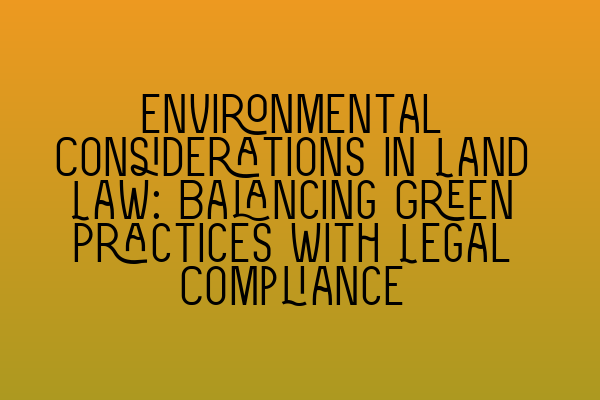Environmental Considerations in Land Law: Balancing Green Practices with Legal Compliance
In today’s world, where environmental concerns are becoming increasingly important, it is crucial for property lawyers to understand and address the environmental considerations within land law. As a solicitor specializing in property law and land law, I am committed to finding the right balance between green practices and legal compliance. In this blog post, we will explore the challenges and opportunities in integrating environmental considerations into land law, and how this can benefit both property owners and the planet.
The foundation of environmental considerations in land law lies in the recognition that land is a finite resource that must be managed sustainably. With the growing awareness of climate change and the impact of human activities on the environment, property owners and developers are now more aware than ever of the need to minimize the ecological footprint of their projects. This includes complying with environmental regulations, implementing sustainable practices, and considering the long-term effects of their actions.
One key aspect of environmental considerations in land law is compliance with environmental regulations. These regulations, set by governmental bodies, are designed to protect natural resources and ecosystems from degradation and to promote sustainable development. As a solicitor, it is my duty to ensure that my clients are fully aware of these regulations and are in compliance with them. This may include obtaining the necessary permits and licenses, conducting environmental impact assessments, and mitigating any adverse effects on the environment.
Furthermore, integrating environmentally-friendly practices into land law can have numerous benefits. For property owners, embracing green practices can enhance the value and marketability of their properties. Sustainable features such as energy-efficient buildings, green spaces, and water conservation measures can appeal to environmentally-conscious buyers and tenants. Additionally, green buildings often have lower operating costs, saving owners money in the long run.
From an ecological standpoint, integrating environmental considerations into land law can contribute to the preservation and restoration of natural habitats. By incorporating green spaces, wildlife corridors, and sustainable landscaping techniques, we can create environments that support biodiversity and ecological balance. This not only benefits local ecosystems but also contributes to the overall health and well-being of the community.
In order to effectively integrate environmental considerations into land law, collaboration among various stakeholders is essential. This includes lawyers, property developers, architects, engineers, environmental consultants, and local authorities. By working together, we can ensure that sustainable practices are incorporated into land development projects from the planning stage onwards. This may involve exploring alternative energy sources, employing green building materials, and adopting water and waste management strategies that reduce environmental impact.
Additionally, it is important for property lawyers to stay updated on the latest developments and best practices in environmental law. This includes attending relevant seminars, workshops, and training programs to enhance our knowledge and expertise. By continuously educating ourselves, we can provide the best advice and guidance to our clients, ensuring that their projects align with current environmental standards and regulations.
In conclusion, environmental considerations in land law are crucial in today’s world. As a solicitor specializing in property and land law, I am committed to finding the right balance between green practices and legal compliance. By integrating sustainable practices and complying with environmental regulations, we can create a win-win situation for property owners and the environment. Let’s work together to build a future in which both property development and environmental preservation go hand in hand.
Related Articles:
– [SQE 1 Practice Exam Questions](https://fqps.co.uk/sqe/sqe1-preparation/mcq-practice-quiz)
– [SQE 1 Practice Mocks FLK1 FLK2](https://fqps.co.uk/sqe/sqe1-preparation/practice-mocks-quiz)
– [SQE 2 Preparation Courses](https://fqps.co.uk/sqe/sqe2-preparation)
– [SQE 1 Preparation Courses](https://fqps.co.uk/sqe/sqe1-preparation)
– [SRA SQE Exam Dates](https://fqps.co.uk/sqe/sqe1-sqe2-exam-dates)
